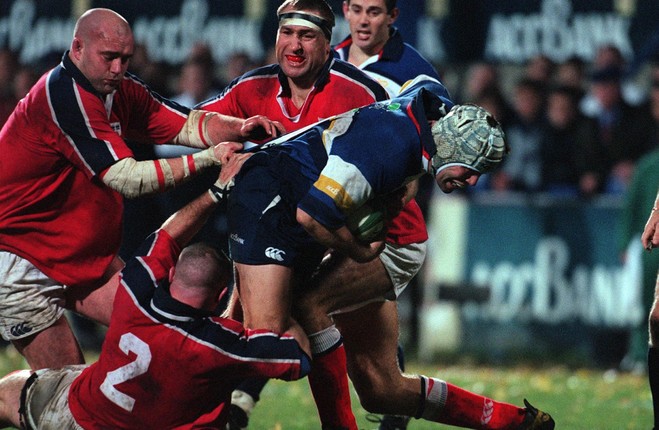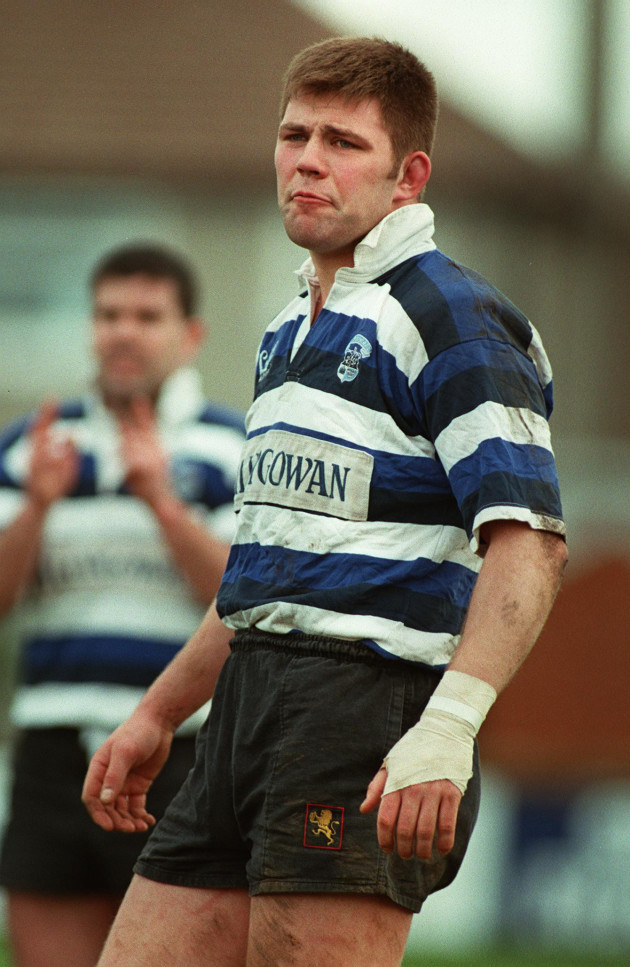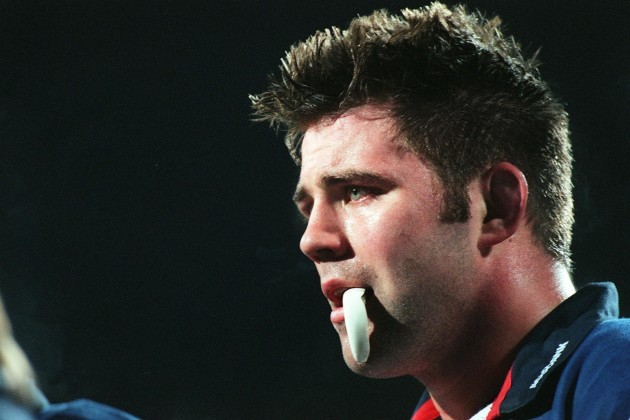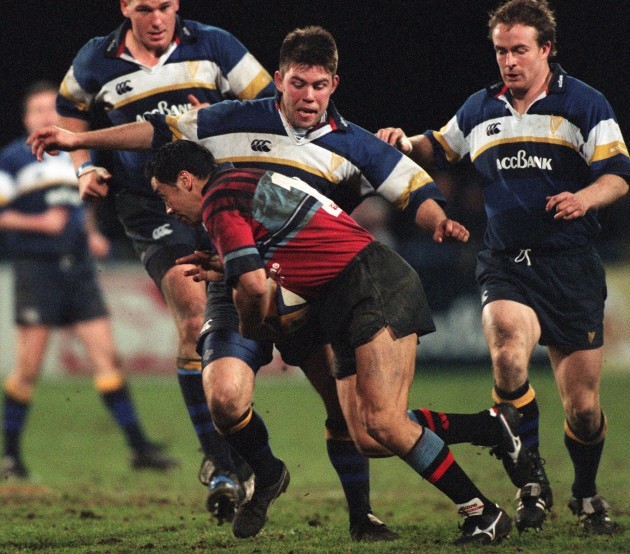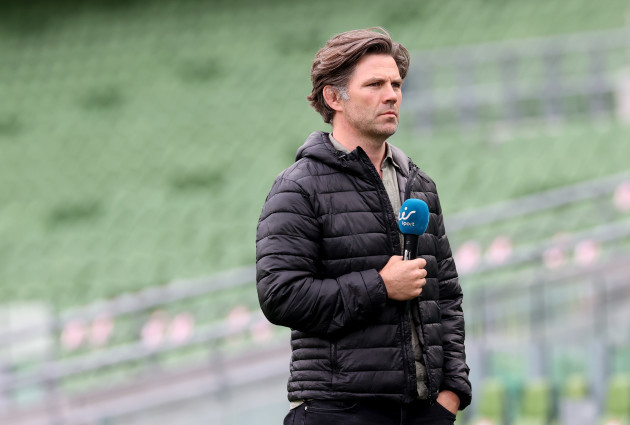IN BETWEEN HIS time with Munster and his spell with Leinster, Liam Toland remembers the trauma of the injury that led to him retiring, temporarily as it transpired.
His neck had been an issue for years, requiring regular anti-inflammatory injections, but it finally gave way when he was playing for Old Crescent against Shannon in the All-Ireland League in 1997.
He knew he was in trouble when someone slammed into him at a ruck but it took until the following Monday, two days on, for the agony to hit.
“I woke up that morning and I will never forget the pain,” says Toland. “It was horrific.”
He ended up lying in bed for the next two weeks trying his best not to move, sleeping very little, listening to the news on 2FM every hour on the hour. Even the slightest shift of his body was excruciating. He compares the pain to a dentist tapping on a nerve while doing a root canal.
Eventually, it started to subside and Toland was able to have surgery to remedy the prolapsed disc but he had decided to call it quits on rugby at the age of 24. Instead, his focus was on a career in the army.
“I was done, I was sick of it,” says Toland, who been playing with Munster after a highly-promising start to his career before it was even possible to be a professional rugby player.
The Tolands lived down the road from the late Cyril Downes – once the Munster Branch president – and his family in Limerick, so Liam and his older brother, Brian, were brought along to Old Crescent, which was Downes’ club.
Toland also played in school for minnows St Clement’s – “I played seven schools cup matches and won none of them, which has to be a world record!” A talented back row, he had two years playing for Munster Schools and then made the Ireland Schools team.
Toland played alongside his neighbour, Fergal Downes, on that side and it was all eye-opening for the Limerick native.
“We played England over in Oxford,” recalls Toland. “It was literally my first time on an aeroplane and my first time out of the country.
“We were all housed on the campus there and I remember thinking, ‘These English guys are massive.’ They walked and talked differently to us, they had an air about them that they were born to do this.”
Ireland beat England on their way to a first-ever Triple Crown at that level. Having signalled his talent again, Toland went on to play three consecutive years for the Ireland U21s and then came close to making his full senior Ireland debut before he had even played for Munster.
Gerry Murphy and Noel ’Noisy’ Murphy had been promoted from the U21s to the senior gig in 1993 and were big fans of Toland’s potential. He played for Ireland A against Wales that year and was man of the match. That summer, he went on the Ireland Development XV tour to Namibia, Zimbabwe, South Africa.
In ’94, regular starting Ireland openside Denis McBride got injured before the Five Nations, which would have meant Toland getting his shot, only that he “banjaxed” his neck playing against Scotland A and was out of action for six months.
He battled back and made his Munster debut against the Irish Exiles in the 1995 Interprovincial Championship, playing alongside his brother Brian, who was also a back row and had a fine career with UCD and Old Crescent.
“Unfortunately, Brian got sent off in that game,” says Liam. “It was a terrible decision. But the good news is he met his wife that evening!”
Toland started two of Munster’s Heineken Cup games the following season but there was a real fight for back row spots, with David Corkery, Eddie Halvey – “the best back-rower I played with or against” – Anthony Foley, and Ben Cronin vying for places. Some top-class flankers didn’t even make it into the Munster squad in the mid-90s.
“I remember asking one of the selectors, ‘Where’s Ger Earls?’” says Toland. “He played the same position as me so I should have said nothing, but I couldn’t understand it. They told me they didn’t think Ger was up to it. I had to tell them Ger was very much up to it.”
The Munster players were getting match fees at this stage, rugby having moved to professional status in 1995, but this was a long way from the sport as it is today.
Mick Galwey emerged as the major leader in that Munster squad, with Peter Clohessy influential too and Toland remembers it as a very “player-driven” culture. Toland – who was a student of Economics and Maths in Galway at the time – quickly appreciated how big the rivalry with Leinster was.
“My first one was in ’95 and the whole build-up became something much more than just Munster v Leinster, there were so many subplots. Everybody knew this was an Ireland trial.
“Back then, you played for your club in the AIL, then your province only had five games a season maybe, then a final Ireland trial. So if you got picked to play for Munster versus Leinster, it was maybe your one chance for 12 months to be seen against your direct opponent for an Ireland place.”
While he also broke his leg at one point, Toland neck’s was a constant issue throughout his time with Munster and it gave up in ’97, leading to him deciding to hang up his boots after the surgery.
He stopped training, put on three stone in weight, and had completely given up on the sport until a chance meeting with Donal Lenihan, who was the Ireland manager, at the Castletroy Park Hotel several months after his operation.
“He saw me and just said, ‘Mother of God, what have you been doing?” says Toland with a laugh.
It turned out that Lenihan had undergone the same operation as Toland and returned to play three more seasons of international rugby. England’s Jason Leonard had done the same. Toland listened with interest to Lenihan’s story and was inspired.
He started training again the following day, beginning to build his neck up, and shedding that three stone over the next two months.
At this point, Toland’s career with the Defence Forces was taking off and he was stationed at the Cathal Brugha Barracks in Dublin. He decided to return to rugby and linked up with Lansdowne FC.
“I went back to play just to enjoy it. I had parked all ambitions and I would have been happy to play for the thirds.”
Toland thrived in an excellent Lansdowne side that also included the likes of Shane Horgan, Gordon D’Arcy, Reggie Corrigan and Kurt McQuilkin. He was named player of the year at the end of his first season and Leinster boss Mike Ruddock, who was assembling the province’s first full pro squad, asked him to come on board in ’99.
Working with the army and now unmotivated by higher glory, Toland initially said he wasn’t interested.
“Mike said to me, ‘You’re not actually my first choice’ and I just had to laugh and ask where I was on the list.
“I told him to give me a call whenever he got down to me on the list, I’d think about it. Eventually, Mike came back to me and said, ‘I’ve whittled through the list and you’re now number one.’”
Toland struggled to secure leave of absence from the army but eventually got the nod and so started four seasons as a pro rugby player. A boozy pre-season trip to Wales - ”I’ve never consumed as much alcohol in my life” – helped Toland in bonding with the new group but it was definitely a big deal for a lad from Limerick to be a Leinster player.
“My mates in Limerick were asking me, ‘What are these Leinster lads like?’ as if they were animals!
“I told them that the Leinster players train hard, play hard, enjoy their drink – they’re exactly like us but they just have a different accent.”
Four weeks after he joined, out of the blue, Toland was asked by Ruddock if he would be Leinster’s new captain.
“I said, ‘Absolutely no way. I was an amateur four weeks ago, I’m new to this whole thing. No.’”
Again, Ruddock’s persuasive side came into play and Toland accepted the role. A Munster man captaining Leinster was certainly a big deal and it also perhaps indicated where a very gifted squad was lacking.
“The culture at that stage was more coach-led,” he explained. “The players wanted to improve on what they weren’t good at and looked to their coach for that. Munster players were more focused on just how to win a match.
“There was so much talent in Leinster but there wasn’t quite a natural leadership there just yet.”
Playing against his native Munster was a strange experience for Toland. On the first occasion, he and Galwey were the captains, with Alain Rolland – who they had both played with and against – refereeing.
“Alain gave the two of us a speech but we didn’t give a shit what he was saying. He gave us a warning to take it easy on each other out there.
“For some reason, Gaillimh and I just bear-hugged each other and started bursting laughing. Then we went out and killed each other.”
Toland captained Leinster for two seasons and started all 12 of their Heineken Cup games at openside in that time as the province recorded some fine wins over Leicester and Northampton – the reigning champions – but they were an inconsistent force.
Toland’s form got him back into the Ireland A squad in 2001, although he was denied another appearance by the foot and mouth outbreak.
Matt Williams had taken over from Ruddock as Leinster’s head coach in 2000 and led them on to their 2001 Celtic League final success against Munster. Toland didn’t play in that final but feels it was an important moment in Leinster’s journey, with future European champions like Brian O’Driscoll, Leo Cullen, Shane Horgan, and Girvan Dempsey all playing.
“There was just a fatigue of losing those big games by that stage,” he says. “Winning that one was massive, the first major victory over Munster in that era.
“We had beaten some big teams in Europe, why couldn’t we beat Munster consistently? There was a cultural piece that was missing.
“It was understanding when to play rugby and when not to play rugby. You didn’t have to play against Munster and score four tries, a 3-0 win is perfectly acceptable. But that element of the culture hadn’t really been there.”
Aussie out-half Nathan Spooner – “pure class” – was vital in that final while Keith Gleeson was in the number seven shirt having arrived from the Waratahs earlier that year and made a major impact, blowing everyone away with his quality, Toland included.
“I learned more about rugby from watching Keith than I did in any sense of being coached. Himself and Willie Anderson, when he was our continuity coach in Leinster, were the two.
“Statistically I was the same as Keith in many senses but after his first game, I just thought, ‘Wow, I didn’t know opensides could play like that.’ I adapted to his style and enjoyed it but he was the de-facto starting player from then on.”
Toland played with Leinster into the 2002/03 season and was the co-founder of IRUPA, the players’ association, during his time as a pro. He had a good offer from Exeter in England to play on, while Alan Gaffney asked him to come back down to Munster when David Wallace was ruled out with a long-term injury, but his leave of absence from the army had been strung out for four years at this stage.
He would have had to leave the army to play on, so his rugby career “sort of petered out” and Toland retired for good. He stresses just how much he enjoyed his “second life” in the game but admits that he struggles with framing his career.
“I don’t have 50 caps, I don’t have a Lions tour, a European Cup,” he says.
“At one point, from the age of 19, it looked like I would have an international career. Then injuries started coming in and I’ll never know if I would have got there.
“Did I overachieve or underachieve? I don’t know, but I would say that I have never framed it as anything particularly positive.
“And yet, I loved every minute of going back and having those four years. It would have been lovely to get more success, but I loved it.”
Toland – who retired from the army in 2009 and now runs Home Instead Senior Care – remains passionate about the game through his underage coaching with Old Crescent and his commentary work with eir Sport.
Tonight has him in Thomond Park for the latest episode of the Munster v Leinster rivalry [KO 7.35pm on eir Sport/deferred coverage on TG4 at 9.30pm] and it feels like the good old days given the strength of the teams and the fact that Ireland’s Six Nations squad is being named on Monday.
“This game is the closest to what it was like back in the ’80s or ’90s. There’s so much riding on it.
“There aren’t back-up games to be able to recover from this. There’s so much in flux with new Irish coaches and tactics but that means there is opportunity for players.
“When was the last really great Leinster-Munster game? This is a full-circle moment.”
Munster:
15. Mike Haley
14. Keith Earls
13. Chris Farrell
12. Damian de Allende
11. Shane Daly
10. JJ Hanrahan
9 Conor Murray
1. James Cronin
2. Rhys Marshall
3. John Ryan
4. Jean Kleyn
5. Tadhg Beirne
6. Gavin Coombes
7. Peter O’Mahony (captain)
8. CJ Stander
Replacements:
16. Niall Scannell
17. Dave Kilcoyne
18. Stephen Archer
19. Fineen Wycherley
20. Jack O’Donoghue
21. Craig Casey
22. Ben Healy
23 Rory Scannell
Leinster:
15. Hugo Keenan
14. Jordan Larmour
13. Garry Ringrose
12. Robbie Henshaw
11. Jimmy O’Brien
10. Johnny Sexton (captain)
9. Luke McGrath
1. Cian Healy
2. Sean Cronin
3. Andrew Porter
4. Scott Fardy
5. James Ryan
6. Rhys Ruddock
7. Will Connors
8. Caelan Doris
Replacements:
16. Rónan Kelleher
17. Ed Byrne
18. Thomas Clarkson
19. Ross Molony
20. Jack Conan
21. Jamison Gibson-Park
22. Ross Byrne
23. Josh van der Flier
Referee: Andrew Brace [IRFU].
